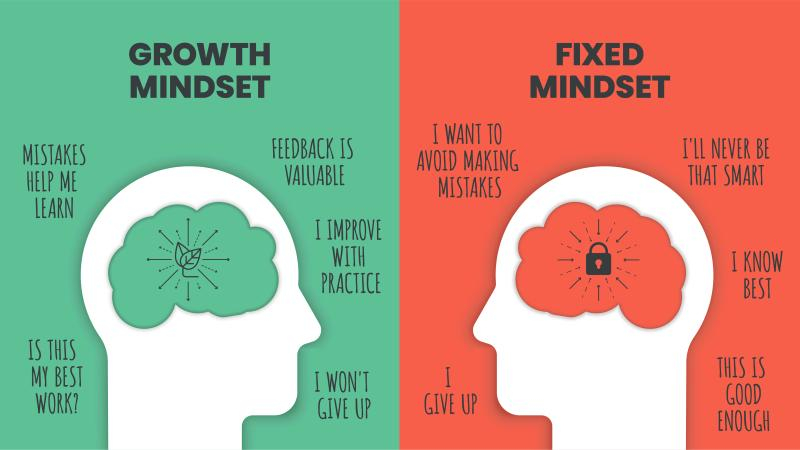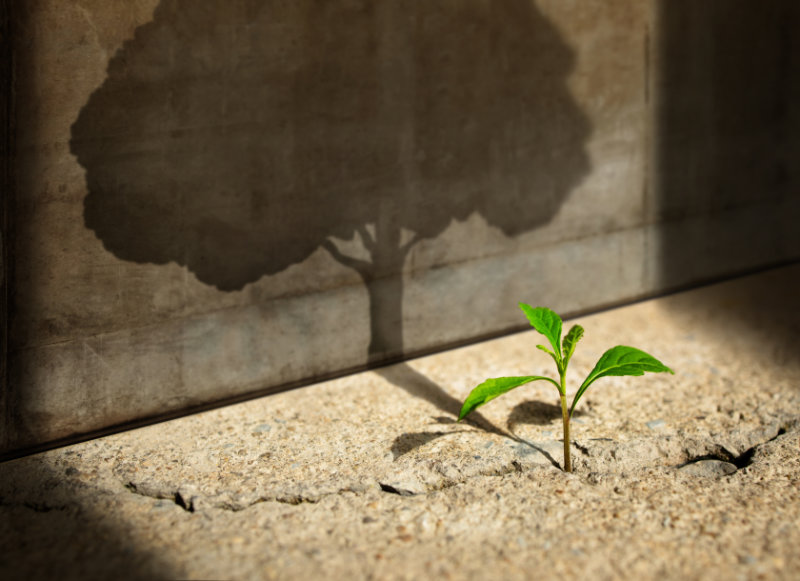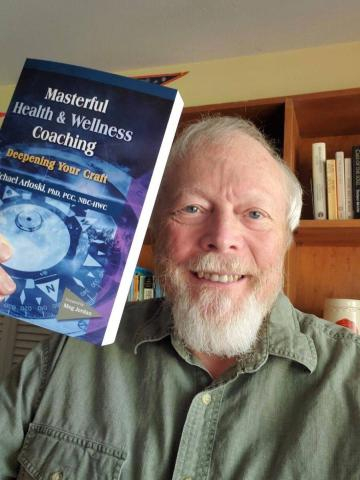The Growth Mindset vs. The Fixit Mindset in Coaching

“We define mindsets as core assumptions that we have about domains or categories of things that orient us to a particular set of expectations, explanations, and goals. So to put that a little bit more simply, mindsets are ways of viewing reality, that shape, what we expect, what we understand, and what we want to do.” Alia J. Crum, PhD. (https://www.gsb.stanford.edu/insights/mindset-matters-how-embrace-benefits-stress)
As I grew up, I had the mindset that I was not mechanically inclined. Sure, I could do some things, and had served as a third hand for my high school best friend as he fixed up his old Ford with the Thunderbird engine. I, however, thought that my talents lay elsewhere. After college I bought my first ten-speed bicycle and enjoyed riding it immensely. I could change a flat and tighten up my brakes, but still held the belief that I was just not mechanically gifted. Then, in my doctoral program I started riding with a fellow student who had just left his job as a full-time bicycle mechanic. Under his tutelage I slowly opened up to doing more of my own repairs. My mindset started to give way to changing. When I had accomplished the feat of repacking my own wheel bearings, I realized that doing mechanical work was not a “gift” one was blessed with or not, it was a learning process, and the important thing was – I could do it!
The point in telling this story is that our mindsets shape who we are, or rather, who we think we are. And they shape how we coach.
Stanford University Professor and research psychologist, Alia Crum’s work on mindset helps us understand its importance and relevance to our field of wellness coaching.
“Mindsets are core assumptions we make about the things and processes in the world that orient us to a particular set of expectations, explanations, and goals, for example: “aging is an inevitable decline”, “cancer is a catastrophe”, “healthy foods are disgusting and depriving.” The world is complex and uncertain and yet we need to predict what will happen in order to act. Mindsets are our human way of simplifying and understanding a complex reality. The mindsets we adopt are not right/wrong, true/false, but they do have an impact. Mindsets can change our reality by shaping what we pay attention to, how we feel, what we do, and what our bodies prioritize and prepare to do.” (https://www.parulsomani.com/post/mindsets-q-a-with-dr-alia-crum-stanford-psychology)
Check out Dr. Crum’s work on how our mindsets create our own reality and affect our responses to exercise, food and stress. (https://psychology.stanford.edu/people/alia-crum)

The concept of the Growth Mindset vs. the Fixed Mindset was pioneered by a Stanford Colleague of Crum’s: Dr. Carol Dweck. Her work showed us the tremendous effects of the mindset we hold about intelligence. Is your intelligence fixed, or malleable? Here are some thoughts from an excellent blog about Dweck’s work. “Your view of yourself can determine everything. If you believe that your qualities are unchangeable — the fixed mindset — you will want to prove yourself correct over and over rather than learning from your mistakes.” “…as you begin to understand the fixed and growth mindsets, you will see exactly how one thing leads to another— how a belief that your qualities are carved in stone leads to a host of thoughts and actions, and how a belief that your qualities can be cultivated leads to a host of different thoughts and actions, taking you down an entirely different road.” “In fact Dweck takes this stoic approach, writing: “in the growth mindset, failure can be a painful experience. But it doesn’t define you. It’s a problem to be faced, dealt with, and learned from.” “We can still learn from our mistakes. The legendary basketball coach John Wooden says that you’re not a failure until you start to assign blame. That’s when you stop learning from your mistakes – you deny them.”
(https://fs.blog/carol-dweck-mindset/)

Growth Mindset vs. Fixit Mindset in Coaching
Allow me to extrapolate on Dwek’s work and think of the mindset we hold in coaching both towards ourselves and our client. The wellness field is founded on the principles and concepts of people like Abraham Maslow, Carl Rogers, and others who saw people being drawn towards actualizing their potential. This emphasis on personal growth is also foundational to the coaching field. When we work with a client do we see their personal growth as the ultimate goal of coaching, or do we view coaching primarily as problem solving? Growth mindset or ‘fixit’ mindset?
The Growth Mindset in coaching is about possibilities. In coaching we do strategic problems solving, but so much more. We ask “What’s possible? What could be?” We operate on a growth mindset instead of asking “What’s wrong and how can we fix it?”
Remember Alia Crum’s words “mindsets are ways of viewing reality, that shape, what we expect, what we understand, and what we want to do.” When we approach a coaching session as a time when we help our client to work on their ‘issues’, we may be still operating from a clinical mindset, or at least from a consultant mindset, instead of a coaching mindset. Are we always looking for a problem to solve? Many consultants name their business XXXX Solutions, Inc. Are we framing coaching as mostly a solution-finding process? I see books on coaching that hold out the promise of teaching you a method to get to the heart of the problem/issue quickly and effectively. Is that what coaching is all about?
Perhaps our client comes to us to work on managing their stress better. If we take a problem-solving approach to stress management, we are flirting with futility (as well as infinity). With the Fixit Mindset, there will always be a problem to work on, one arising as another is resolved, keeping the client in a continual game of “whack a mole.”
Evoke Transformation
The authors of Co-Active Coaching (a truly foundational book of the field of life coaching) set out four Cornerstones of Coaching to give us a foundation to build on. (https://coactive.com/resources/books/coactive-coaching-4th-edition)
The fourth Cornerstone is EVOKE TRANSFORMATION. We are urged to approach coaching as a growth process, one that results in the person transforming into their best self, living their best life possible. When we coach from a Growth Mindset, we are framing the whole process through that lens. We are coaching for what’s possible, for the actualization of that person’s potential, for what could be.
While we may have a client who simply wants to get more sleep or prevent the onset of a chronic illness. Perhaps a fairly straightforward behavioral process based on sound coaching structure enables them to succeed with just that. Yet, we are serving our client best when we interact with them in such a way that we are honoring their autonomy, holding them to be “naturally creative, resourceful and whole.” (The first of the Cornerstones of Coaching.). Who knows what our client may discover on their coaching journey if we are approaching the coaching process with a whole-person approach and a Growth Mindset.
Part of our challenge is that most of our clients come to us with a Fixit Mindset of their own. They are used to working with consultants that analyze their problem and make recommendations. While that works fine for treatment, it doesn’t really fit what we do in coaching.
Some clients also show up with no discernable ‘problems’. Their health may be just fine, for now. The wise coach will praise the person for their good health and inquire if they have a conscious plan for how to stay that way. So, in effect, prevention itself fits the Growth Mindset better than a Fixit Mindset. As we explain how coaching works and build the coaching alliance, we help our clients to make a mindset shift of their own.

Default to Growth
Mindsets are like default settings. When we have made the shift from a Fixit Mindset to a Growth Mindset it is what we default to, over and over again. Of course, we help our clients to solve problems, to identify and overcome barriers, to do strategic thinking, brainstorming and more. With a Growth Mindset the problems are solved in order for the person to grow, not just as an end unto themselves.
Maslow’s theory of Self-Actualization always maintained that we human beings have a natural, innate drive towards actualizing our potentials. Barriers arise that hold us back and prevent us from moving forward in that actualization process. But when we are able to remove those barriers the growth process takes over and we grow and thrive. Coach with the lofty goal of transformation.
 Michael Arloski, Ph.D., PCC, NBC-HWC is CEO and Founder of Real Balance Global Wellness – a world leader in health and wellness coach training (https://realbalance.com/). Doctor Arloski is a pioneering architect of the field of health and wellness coaching. He and his company have trained thousands of coaches around the world.
Michael Arloski, Ph.D., PCC, NBC-HWC is CEO and Founder of Real Balance Global Wellness – a world leader in health and wellness coach training (https://realbalance.com/). Doctor Arloski is a pioneering architect of the field of health and wellness coaching. He and his company have trained thousands of coaches around the world.








Only registered and logged in readers can leave comments.